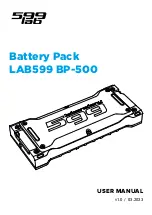
4
v. NEVER smoke or allow a spark or flame in vicinity of battery or engine.
vi. Be extra cautious to reduce risk of dropping a metal tool onto battery. It might spark
or short-circuit battery or other electrical part that may cause explosion.
vii. Remove personal metal items such as rings, bracelets, necklaces, and watches when
working with a lead-acid battery. A lead-acid battery can produce a short-circuit cur-
rent high enough to weld a ring or the like to metal, causing a severe burn.
viii. NEVER charge a frozen battery.
ix. If necessary to remove battery from service, always remove grounded terminal from
battery first. Make sure all accessories are off, so as not to cause an arc.
x. Be sure area around battery is well ventilated.
xi. Clean battery terminals. Be careful to keep corrosion from coming in contact with
eyes.
xii. Study all battery manufacturer’s specific precautions such as removing or not remov-
ing cell caps while charging and recommended rates of charge.
xiii. Add distilled water in each cell until battery acid reaches level specified by battery
manufacturer. This helps purge excessive gas from cells. Do not overfill. For a battery
without cell caps, carefully follow manufacturer’s recharging instructions.
3. BATTERY CHARGER LOCATION
i. Never place battery charger directly above battery; gases from battery will corrode
and damage converter.
ii. Never allow battery acid to drip on battery charger when reading gravity or filling
battery.
4. O/P CONNECTION PRECAUTIONS
i. Connect and disconnect DC output connections only after setting battery charger
switch to off position.
GROUNDING AND AC POWER CORD CONNECTION INSTRUCTIONS
— The plug must
be plugged into an outlet that is properly installed and grounded in accordance with al local
codes and ordinances.
DANGER
— Never alter the AC cord or plug provided. If it will not fit the outlet, have the
proper cord installed by a qualified electrician. Improper connection can result in a risk of an
electric shock.
Analytic Systems does not recommend the use of the BCA310 Series Battery Chargers in life
support applications where failure or malfunction of this product can be reasonably expected
to cause failure of the life support device or to significantly affect its safety or effectiveness.
Analytic Systems does not recommend the use of any of its products in direct patient care.


































